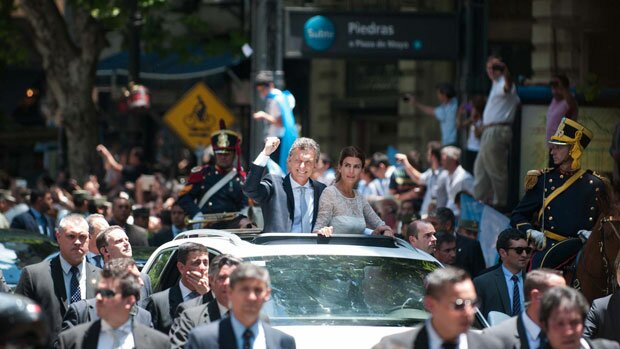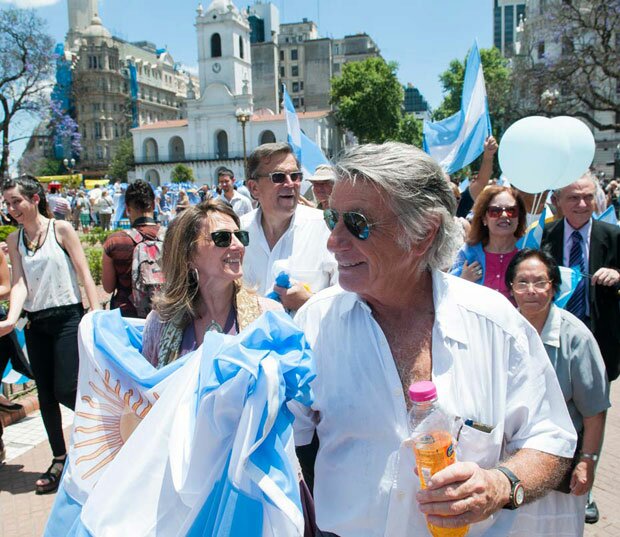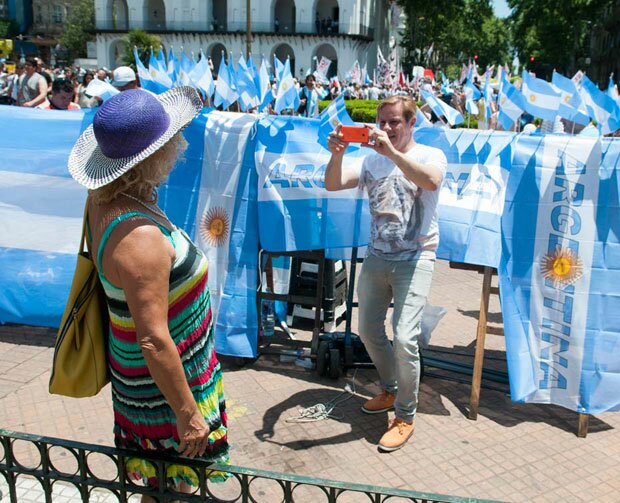From the plaza beneath Argentina’s presidential palace, Anfibia’s Andres Fidanza surveys the crowds who turned out to celebrate the election of the country’s first conservative president in many years.
Two hours before Cristina Kirchner spoke, Oscar Carrizo — brown curly hair, glasses, cargo shorts, a man proud of his 25 years of experience in the art of street vending — had sold all 400 of the Argentine flags he took to Plaza de Mayo for the former president’s outgoing ceremony.
The next day though, he had only sold 120 flags — less than half of the day before — after Mauricio Macri had been sworn in, taken power, read his speech and only awaited his dance on the balcony of the Pink House and the public thank-you.
Carrizo buys the taffeta fabric for the flags in the Once neighborhood, cuts them at his home in Laferrere, sends them to be sewn at a small local shop and stamps them with his own printer. His biggest sales are before and after soccer matches between Boca Juniors and River Plate. He tries to sell merchandise for political events as well, but has uneven luck.

And from the sacred Peronist balcony, the president responds: “Yes! We could!”. Photo : Santiago Cichero/Anfibia
“These people came in their cars and have a lot more money than the people yesterday,” the 62-year-old laments. He miscalculated the supporters of the new president.
For Cristina’s ceremony he sold two types of flags: one with Cristina’s face and the caption “It was not magic”, and the other a profile of her together with [deceased husband and former president]Nestor Kirchner. For today’s ceremony, he made some of Macri and others with Macri and Maria Eugenia Vidal next to the words “Yes we can”, the phrase that turned into the informal slogan for (Macri’s campaign) Cambiemos. In part because of his success yesterday and in part because of the different economic class of his potential buyers, Carrizo raised the price of his flags: They went from 80 pesos to 100 pesos in less than 24 hours.
“Turns out they are stingier than I thought,” says this professional street salesman.
His comments might suggest the existence of bipartisan class struggle, in which the Kirchners represent the people and Marci the oligarchy, but Carrizo quickly discards this hypothesis: “The truth is, I voted for Macri because I was sick of Cristina.”
A broad survey of the social classes that turned out in the Plaza de los Dos Congresos and the Plaza de Mayo to celebrate Macri’s inauguration suggests they are imperfect stand-ins to understand who voted for him. The thousands (not more than 20,000) of people who showed up in both plazas are rather the hard nucleus of Marci’s supporters: a social substrate that does not answer to the power of the unions or big landowners; families and lone wolves, mostly from the upper middle class who say they hate politics and abhor the traditional political parties, and have a special disdain for Peronism. All of these people are gathered to express their confidence in “Mauricio”, but despite this their presence does not translate into concrete expectations as to what they want from his government.
What changed for so many skeptical people to suddenly believe in this heir of the people who sold the country out, a millionaire who got into politics less than 15 years ago? It is difficult to know: It turns into an act of faith, in the same way that Peronism is referred to as a feeling or people talk about ‘emotional Kirchnerism’.
Santiago Reigada, a 50-year-old teacher from Pilar, stands in front of Congress with two of his five kids. He is thinking about a historic utopia as he is about to hear his president speak.
“Mauricio seems like a coherent and reliable person to me, one that can turn Argentina into the power it was in the 1930s, when we were the sixth most powerful country in the world.”
Silvia, Silvina and Paula, three 40-something friends, came from Palermo to cheer Macri on.
“We have no doubt that Mauricio is going to fight insecurity and get corruption out of the government,” they recite together, and then repeat.
These are the people who supported him and will probably continue supporting him even when things heat up and his popularity begins to decline.
With his fitted, Navy blue suit, white shirt and sky blue and white tie, Macri intentionally chooses to change one line of the oath: “I, Mauricio Macri, swear by God, our Lord and the Heavenly Gospel to perform with loyalty and honesty the duties of the President of Argentina”. A bit stiff, standing in front of the Legislative Assembly in Congress, he says ‘honesty’ instead of ‘patriotism’, as it appears in Article 94 of the constitution.
And even if that change goes unnoticed within the chamber walls, the mere omission of the word, loaded with anti-Kirchner complicity, is celebrated outside the Senate, in the Plaza de los dos Congresos and on the sidewalks of nearby streets, like a winning goal.
Just like Cristina Kirchner, Macri knows perfectly well the hits his fans want to hear, and he plays the original version before they even ask for it.
Without the intervention of supporters’ drums and chanting, Marci’s speech can be heard perfectly in the streets. The audio is clear because there is not a multitude covering the two speakers at the entrance to Congress.
Working against his normal rapid delivery, and his tendency to slur his words, the president reads out his speech, tries to modulate his voice.
“Come on, Mauricio, yeah! Get rid of the thieves,” yells 33-year-old Matias Rocha, a graduate in business administration from UADE, an employee of the private ‘Green and Red’ school in the town of Tigre. Obligated by the heat to wear his red shorts and alpargatas, Rocha trusts Macri “because he doesn’t have the bad habits that politicians have”. Despite the impression that supporters like Matias Rocha have, Macri has a history as a businessman but is not an outsider to politics: He first ran for office in 2003 and since he was president of the Boca Juniors soccer club he has been preparing his leap into politics.
His inauguration speech includes veiled criticisms of the 12 years the Kirchners ran the country, criticisms easily decoded by the thousands of people who celebrate with applause each reference to freedom, to the struggle against authoritarianism and the need for an independent court system.
“I want to request that our meeting-place be the truth. Politics are not a place to lie to thousands of people with false data. We have to recognize the problems so that together we can find better solutions,” Macri says, referring to the (government statistics agency) Indec, and again gets a round of applause from the thousands who are watching him on the big screens outside Congress.
“We beat the government apparatus, with its media outlets, its bribed officials and its national television network. It was historic!” says Leandro Bello, the secretary of the students’ center for the law school at the University of Buenos Aires. Twenty-two years old, with dark glasses and a yellow t-shirt, Bello is among 30 university activists for Marci’s PRO party who line up next to a barricade separating them from the congress building.
Macri and his supporters do not seem to be able to get out of the state of shock caused by their victory over Daniel Scioli and his Frente para la Victoria party.
It is understandable: Their triumph destroyed firmly installed myths in Argentine politics: among them the invincibility of Peronism. In democratic elections, Peronism had only lost twice, and both times against the [leftist]UCR party. Up until now, for a conservative third party to beat Peronism seemed like a wild dream. And that is what they are celebrating now, still in surprised joy, in the plaza.
These circumstances have pushed the PRO party to manifest itself as the permanent opposite to the outgoing government. After the failure to negotiate a place to hand over power (a failure as much for Cristina as for Macri and for supporters of both), Macri’s inauguration, in manner and content, from the presidential palace to the street, seems to be thought out as an antagonistic manifestation of last Wednesday when Cristina Kirchner stepped down. And not just in the styles of the two leaders: Macri’s monotone recitation, read and hyper-rational, somewhat devoid of concrete political proposals next to Kirchner’s impassioned and ideological exaltation.
After a 27-minute speech, Macri leaves Congress. Together with his wife Juliana Awada, they get in a white Volkswagen Touareg and head for the Pink House, flanked by guards and police on motorbikes.
Far from the popular support kirchnerismo received last night and throughout their government (unions, students and other social organizations), Macri’s plaza quickly turns into an exercise in spontaneity. Even if that was not the objective his party’s marketing was explicitly looking for, that is how it turns out. And just like the Art of Living, a kind of New Age philosophy practiced by Marci, if it happens it is good. With this mix of nerve and disdain for old school politics, Macri has gotten pretty far.
In Plaza de Mayo there are far fewer people than on Cristina Kirchner’s last day. But for Macri this comparison does not matter at all: The two governments are competing in two very different levels. Macri’s ceremony does not count on its structure or apparatus. There are almost no busses parked along the streets of downtown, except for the 30 busses brought in by Matanzas neighborhood activist Miguel Saredi and the union leader Geronimo “Momo” Venegas.
“We have to fill up the plaza,” said the mayor Vicente Lopez, Jorge Macri, in a Whatsapp group message shared by some the top macrista officials in the municipalities surrounding Buenos Aires. Everyone agreed and promised their support but, except for a few exceptions, there was not a big showing by leaders in the area.
“Direct communication is important. I think it is important in strengthening a movement of the people. Besides, the people from Matanzas wanted to come celebrate,” explains in Plaza de Mayo Miguel Saredi, the former candidate for mayor of Matanzas, while he downs a bottle of water. From the Peronist party, Saredi says he has brought in 1500 of his own activists in 30 busses. The signs, t-shirts and banners reading “Macri-Saredi” prove his point.
The 200 soldiers brought by the union activist “Momo” Venegas, the boss of the rural farm workers, are the other exception to the lack of organization.
“We want Momo to run (Argentina’s largest labor union) CGT,” explains Venegas’ right hand, Jorge Alarcos, while he buttons up his shirt and gives orders to the activists from the shade of a plantain tree. He still does not know if Macri will come out to greet them from the mythical balcony of the Pink House…
A few meters from barrier that separates the people from the Pink House, a tall grey-haired man, by himself, smiles and waves a little Argentine flag. He is a Naval technician and his name is Carlos Sueryas. He hesitates in confessing something and finally lets it out.
“The Navy is broke because of Cristina Kirchner. And I can say that today, but yesterday I would have gotten fired for saying it,” he says.
Sueyras hopes with Macri as president the Armed Forces can recover their lost strength and control the Argentine coastline.
Beyond these cases, and that of a few people who demand prison for Cristina Kirchner and justice for Alberto Nisman [terror-attack prosecutor dead in apparent suicide], Macri’s plaza does lay out a clear path for the future. And Macri does not lay one out with his speech, in which he ends up imposing a vague and joyful tone because of the victory over kirchnerismo.
Once in the Pink House, Macri shows up on the balcony where Juan and Eva Peron gave their historic speeches, the balcony where Cristina Kirchner never went because — as she once explained — she was ‘not worthy of it’. Macri thanks people and dances robotically. His supporters laugh and hold their heads in their hands, as if he were an out-of-line uncle at a family gathering whom they love anyway.
“Yes we can!” the multitude yells at the president.
And from the sacred Peronist balcony, the president responds: “Yes! We could!”
Andres Fidanza Translated from Spanish by Brian Hagenbuch for International Boulevard
21 Jan 2016








































